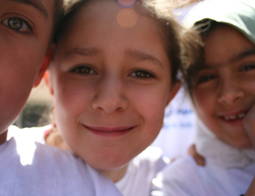Primary Education

©UNESCO/Therese Cregan
‘Everyone has the right to education’ – according to Article 26 of the Universal Declaration of Human Rights.
Aim is to improve the quality of education in general and teaching/learning practices in particular through promoting active learning modality in primary education·
The Primary Education Programs aim at achieving free and good quality universal primary education for all and in particular for deprived groups by the year 2015, this is the second goal of the EFA global initiative identified in the EFA Dakar Conference.
There are still more than 7 million children in Arab States who have not been in schools or dropped out early. It is noted in most Arab States that not much progress has been made to essential educational issues as quality, relevance, and efficient management of primary education.
The Focus of the UNESCO Beirut Regional Office will be on making primary education accessible to all children (Street and Working Children, Special Needs Children, Rural Girls…), improving the quality of education in all aspects, and promoting child friendly schools and inclusive schools through conducting advocacy and capacity building seminars, workshops, conferences, and through implementing pilot projects.
In the quest to achieve Education for All, states must prioritise free and compulsory primary education. UNESCO works to make primary education accessible for all, as well as to ensure full retention and completion, forming the grounds for a further promotion of children’s cognitive, creative and emotional development.
